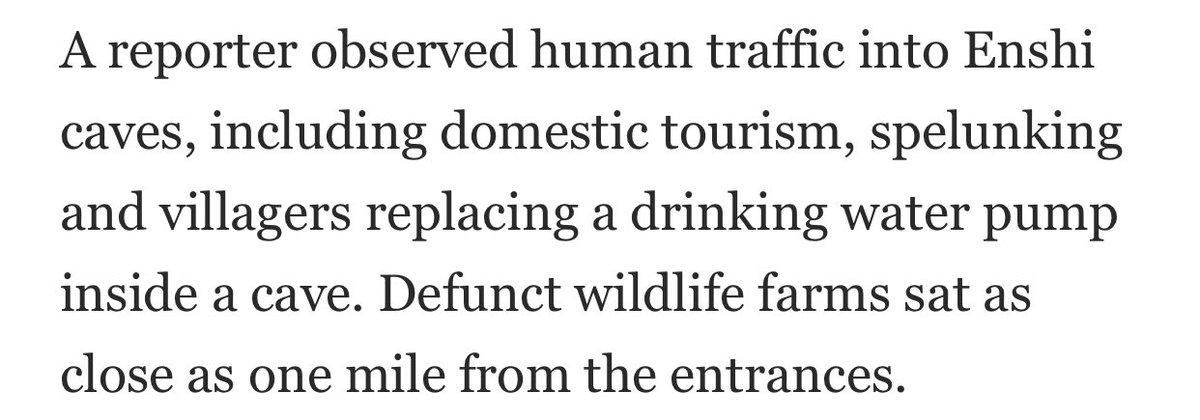
Leakers are very bothered by the @washingtonpost article showing wildlife farms serving Wuhan at the mouths of bat caves. Their response is to dismiss it. washingtonpost.com/world/asia_pac… 

They want to insist (Alina has done two separate threads on this theme) that the failure of farmers, scientists, or the Chinese government to brick up bat caves and quarantine farmed wildlife is proof that those parties don’t *really* believe SARS-CoV-2 is zoonotic.
But here’s the thing. In 2002, civets infected with a bat virus were brought to a market in China. The civet-bat virus jumped to humans, causing a major epidemic that nearly spread globally. We know this. The Chinese government knows this. Chinese farmers know this.
And yet the government encouraged wildlife farming and had no biosafety rules to move civet farms away from bat caves, or to prevent villagers from piping water steeped in virus-laden bat shit down to their farms and villages. They didn’t eliminate live animal markets in cities!
None of that means any of them don’t believe SARS in 2002 wasn’t a zoonotic spillover. It 100% was! Wildlife farming is lucrative though. Failure to move on that front since SARS-CoV-2 emerged doesn’t mean they don’t think it was zoonotic. It means people aren’t always rational.
This isn’t just a China thing. If *I* thought my industrial waste was causing birth defects in the town built on my landfill, *I’d* do something. But that wasn’t how the Hooker Chemical Company handled things in Love Canal.
If someone told *me* that my insecticide was causing bird shells to be so thin that brooding mothers broke their own eggs, I’d probably want to take it off the market. The makers of DDT kept selling as long as they could.
If someone told *me* in 1980 that the oil I was extracting, refining, and selling was going to destroy the world, I’d warn people and change my business. Exxon chose a different path. scientificamerican.com/article/exxon-…
A lot of the lab leak argument hinges on how leakers *think* other people would behave if a leak were true. But they aren’t psychic and their model of other minds seems pretty unreliable. It doesn’t backcast how people handled SARS or a million other things.
So @carolynkor is right that leak claims often rest on a shaky footing of psychological tea leaf reading. And the assumptions behind that are often pretty bad, when tested against what we know for sure. 

I would quibble with what follows in Kormann’s paragraph above. I certainly don’t assume everything WIV says is true, or a complete picture of what they know. Even with that possibility of deceit or incomplete disclosure, I think zoonosis is plausible and a lab escape isn’t. 

• • •
Missing some Tweet in this thread? You can try to
force a refresh
















